12 February 2019
The American Society of Breast Surgeons has issued updated genetic testing guidelines for patients who have been diagnosed with breast cancer. The new guidelines recommend that genetic testing to include BRCA 1/2 and PALB2 mutations (and other genes as appropriate based on clinical scenario and family history) be made available to all newly diagnosed breast cancer patients. They also recommend re-evaluation and consideration of updated testing for patients tested prior to 2014.
Traditional guidelines for genetic testing have focused on age at diagnosis and family history of breast, ovarian and other cancers. However, recent studies have demonstrated that a percentage of patients who do not meet testing guidelines will be found to carry a deleterious mutation that may change surgical and other treatment recommendations. This information could also be helpful to family members who could participate in enhanced screening protocols or consider prophylactic surgery.
Not all genetic mutations are alike. Abnormalities in the BRCA 1 and 2 genes are the most common mutations associated with an increased risk of breast cancer. Mutations in other genes, such as PALB2, CHEK2, PTEN, ATM and others do not convey as high a risk. Treatment decisions in these patients needs to consider family history and other risk factors.
Another important factor to consider is that not all mutations are meaningful. Genetic testing may find a “variant of uncertain or unknown significance (VUS)” – this indicates that there is a mutation in the gene, but there is not sufficient evidence to classify it as harmful or not. Many VUS cases will be re-classified over time to reflect no impact on cancer risk. A smaller number may be re-classified as harmful.
Finally, treatment recommendations and decisions based on genetic testing status need to take into account the individual patient – their age, other medical problems, and their personal preferences.
There are currently several companies that provide comprehensive genetic testing, and costs have come down considerably. It is hoped that other national organizations, such as the National Comprehensive Cancer Network (NCCN) will update their testing guidelines, and that insurers will broaden coverage for testing. Despite some cautions, these new guidelines are an important step to help ensure that breast cancer patients, their treatment team, and their families have the information necessary to make more informed decisions.









Trackbacks & Pingbacks
[…] Dr. David Euhus discussed that genetic testing does not only potentially impact the surgical procedure that is recommended, but may influence the decision for radiation therapy as well as systemic therapy. In addition, results of genetic testing may impact surveillance for additional breast or other cancers in the patient as well as recommendations for family members. The ASBrS recently updated their genetic testing guideline, recommending that genetic testing be considered for newly diagnosed breast cancer patients. (Additional perspective) […]
Comments are closed.